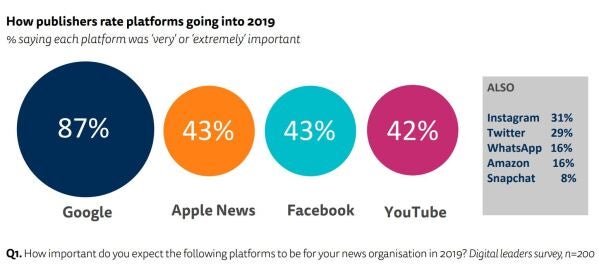
This year could see the “biggest wave of journalistic lay-offs in years” and a final reckoning for social media giants, according to the Reuters Institute for the Study of Journalism which has set out its media predictions for 2019.
News publishers will look to subscription and membership models to make up for the continued loss in advertising revenue as consumers shift online, “but the limits of this are likely to become apparent”, the report warns.
“Journalism will continue to be hollowed out by structural shifts that have already led to significant falls in advertising revenue.”
Together, these trends are likely to threaten jobs and weaken the ability of publishers to hold powerful leaders to account, the Journalism, Media, and Technology Trends and Predictions 2019 report warned.
The institute surveyed 200 digital media professionals, one-third of whom were from the UK while the rest spanned 29 countries, including Germany, the US and Australia.
Of the 200, 40 held editor-in-chief titles, 30 were digital heads and 18 were chief executives or directors.
More than half (52 per cent) of respondents said they expected subscriptions and memberships to be the main revenue focus for publishers this year.
This compares with just over a quarter (27 per cent) who said native advertising and 7 per cent who said donations.“This is a huge change of focus for the industry,” said report author Nic Newman.
He said 2019 would also be “the year when the regulation of platform companies starts to bite following growing concern about misinformation, privacy, and market power”.
The Cairncross Review into how to sustain quality journalism in the digital age is expected to deliver its findings within the first half of the year, with possible repercussions for social media giants.
Channel 4 News editor Ben de Pear told the report that 2019 was a “crucial year” in which social media platforms “have to prove they care about the truth and about paying for serious journalism, or be properly forced to do both by regulation”.
Facebook, which last year changed its News Feed algorithm to promote less news content to users, has slipped down the news industry’s list of priorities, with fewer than half of survey respondents saying the platform is likely to be important or extremely important this year.
About the same level of importance was given to Apple News and Youtube. Google, however, remains a key priority for eight in ten survey respondents (87 per cent).

Said Newman: “The differences in ratings are partly a reflection of the lower number of referrals that publishers now get from Facebook following algorithm changes, but there also appears to be a change in sentiment toward third-party platforms in general.
“Many publishers have been burned by creating bespoke content only to find the goalposts changing or the monetisation slow to materialise.”
He said publishers with paywalls are “increasingly looking at social media as a marketing and acquisition channel, not primarily as a place to engage users with content” with others prioritising channels, such as Youtube, “on the basis of monetisation potential”
Technology set to play a role in journalism in 2019 includes Artificial Intelligence and so-called smart speakers, such as Amazon’s Alexa and Google Assistant, with 7m owned in the UK alone.
More than three-quarters of respondents (78 per cent) said it will be important to invest in more AI to “help secure the future of journalism”, although they said this was not an alternative to employing more editors.
Most (73 per cent) said increased personalisation of news services would be important for the future, with AI playing a significant role.
Three-quarters of respondents (75 per cent) said they believed “audio” news content, such as podcasts, would become a more important part of their content and commercial strategies in 2019.
Voice assistant technology will have a “significant impact on how audiences access content over the next few years” according to 78 per cent of respondents.
In the report’s other findings:
- As platforms step up their battle against misinformation and disinformation the problem will shift to closed networks and community groups where it is harder to track and control;
- There will be a renewed focus on trust indicators for news and better labelling of news content to help consumers decide what and who to trust;
- More consumers will leave social networks as they become conscious of the time they are wasting online, with more focus on “meaningful” content;
- Slow news will become a theme with the launch of new journalistic enterprises such as Tortoise and the Dutch De Correspondent building an English-language website.
Newman concluded: “More news organisations will go to the wall as economic headwinds bite. Tech platforms will remain cautious and defensive in the light of regulatory threats. And the pace of technological change shows no sign of slowing down.
“Artificial Intelligence offers the possibility of more personal and relevant news services, new ways to uncover stories, as well as more efficient ways of packaging and distributing content.
“The blockchain will ultimately open up new forms of payment and verification, while voice assistants could become a major new gateway for accessing media of all types.
“In this context, news organisations will need to be clearer than ever about what they stand for – and about the audience they are serving.
“They’ll also need to find ways to combine their unique human resources with this new wave of technologies to maximise their potential to create more engaging and sustainable journalism going forward.”
Email pged@pressgazette.co.uk to point out mistakes, provide story tips or send in a letter for publication on our "Letters Page" blog
